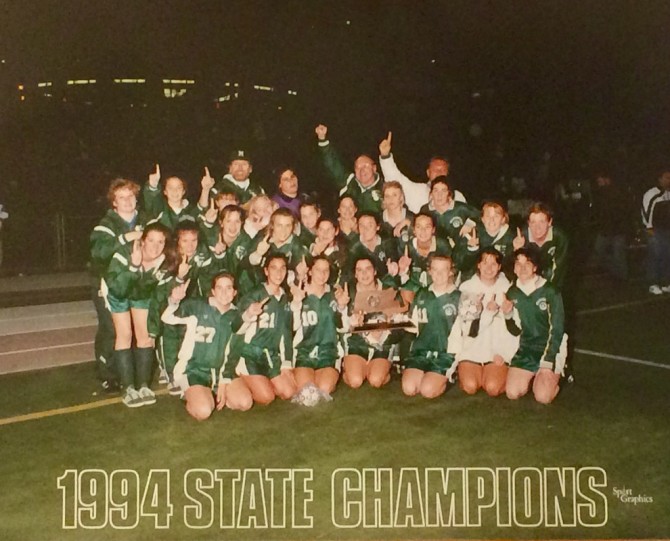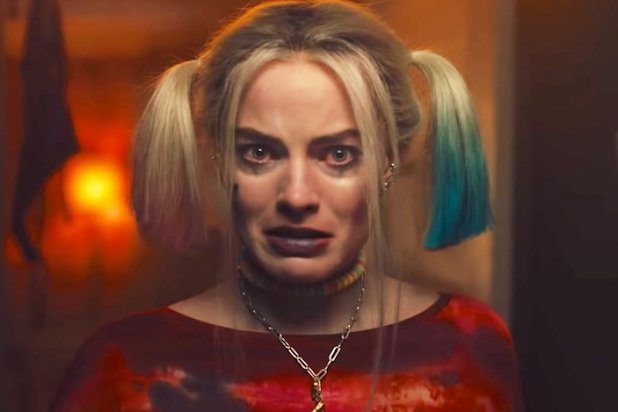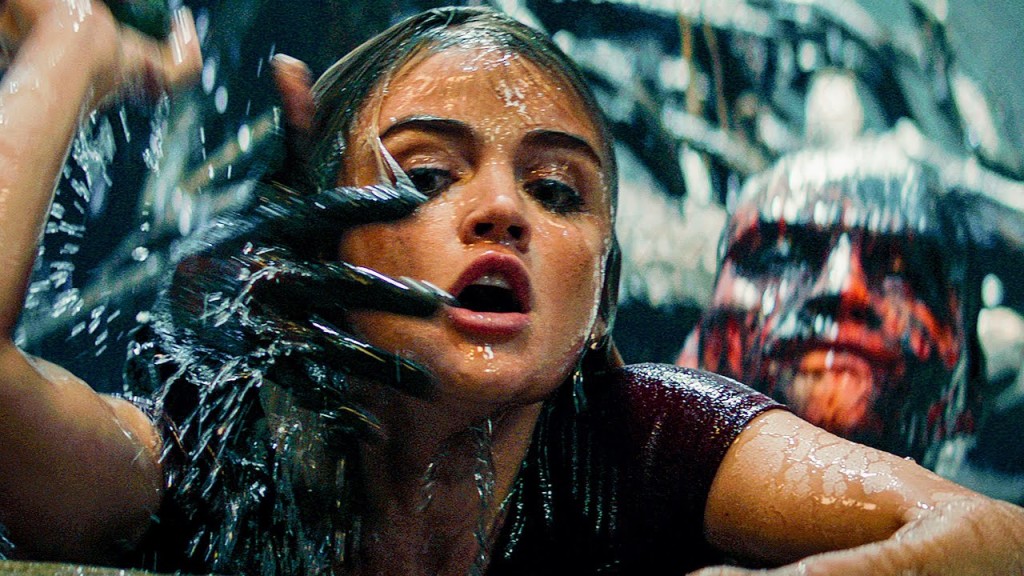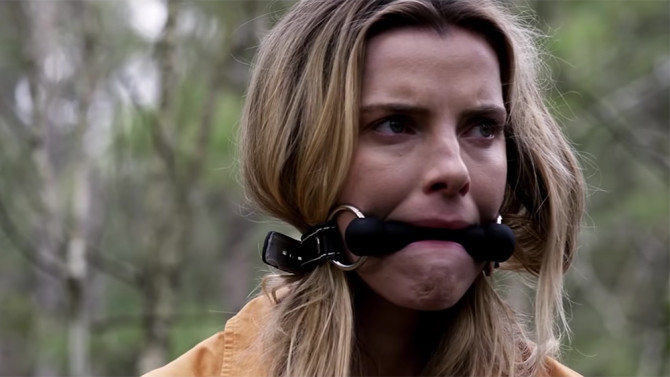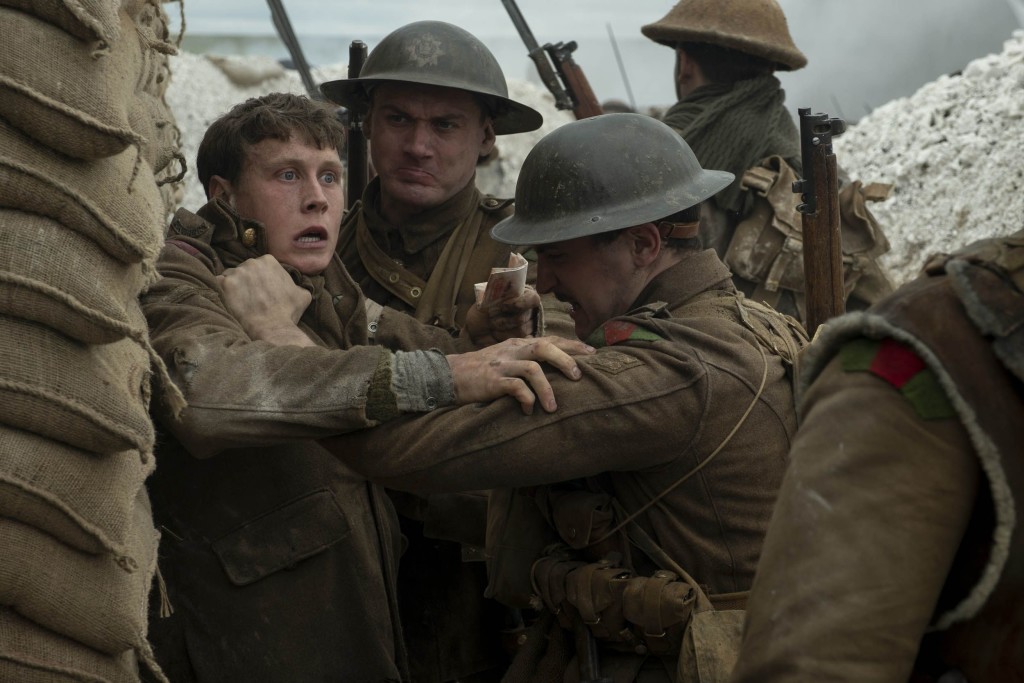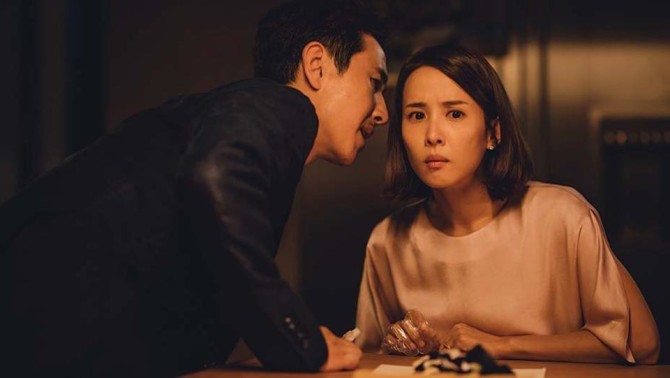Genre: TV Pilot – Drama
Premise: A girls high school soccer team flying to nationals crashes in the remote wilderness. Here, the girls descend into madness while trying to survive.
About: This upcoming Showtime show comes from Ashley Lyle and Bart Nickerson, who created the Netflix show, Narcos: Mexico.
Writers: Ashley Lyle & Bart Nickerson
Details: 65 pages
The other day I was reading a consultation script and I found that one note kept popping into my head. I kept dismissing and dismissing it because I didn’t see any way it would improve the story. So the question was, why was this note so determined to be expressed? I realized, after finishing the script, that the reason the note wouldn’t leave me alone is because the industry is high on it right now.
That note was “Change the main character to a woman.”
There was literally no story reason for the writer to do this, though. Yet the note wouldn’t leave me alone. Which is frustrating because your character choices should be dictated by your story, not what Tinseltown’s latest obsession is. Yet the female-led project is so hot at the moment that when I looked up Yellowjackets, I learned that it wasn’t even the only girls in a plane crash who must fight for their lives in the wilderness show in production (there’s another one called “The Wilds” that’ll be on Amazon).
So if you’re a writer out there, what should you be doing?? Follow the trend or do what you want to do? I think a few things come into play. You shouldn’t blindly ignore a trend. If something markedly improves the chances of your script’s success, you should consider it.
Another big consideration if you’re *not* a female writer is how comfortable you are writing outside your gender. I remember early on when I started writing, I gave my script to a female friend and she eviscerated my main female character. She pointed out half-a-dozen things I’d written that “a woman would never do.” That was a big lesson for me.
Then again, you have writers like Nicholas Sparks and John Green who seem to have an effortless feel for writing female characters. So you need to do a self-assessment on how comfortable you are writing the opposite sex. Cause the advantage you gain from following the trend might be offset by the weakness of the character.
But the most important factor in determining the gender of your protag should be your story. I’m not going to say Fight Club couldn’t be made with all women but that’s an example of a movie specifically about masculinity. Exploring masculinity in an age where men were feeling less masculine than ever was one of Chuck Palahniuk’s main objectives when he wrote the novel. Same thing as I wouldn’t suggest re-imagining “Sisterhood of the Traveling Pants” as “Brotherhood of the Traveling Pants.” It’s probably not going to work. So that’s the biggest thing that needs to be considered.
Okay, despite this introduction, I’m super excited about today’s pilot. I hated every book they made me read in high school. EXCEPT FOR ONE. Lord of the Flies. It’s one of the most powerful setups I’ve ever seen for a story. Plus it’s got a plane crash. And I love plane crash stories! Let’s take a look.
We start off in a snowy wilderness where some kind of ritual is taking place. A teenage girl is running from something before falling into a tiger trap where she’s impaled by numerous wooden spikes. A group of similarly aged girls emerge looking emaciated and wild. They seem satisfied with their kill.
Then we learn that that event we just saw? It happened back in 1994. The people we’re following – the girls who crashed on that island – we’re watching them now in their 40s, long after they returned to society.
There’s Taissa, a popular player on the team who’s now a senator. Shauna, once the team’s best player, now a depressed housewife who masturbates to pictures of her daughter’s boyfriend. And Natalie, a gothy outcast on the team who, when we meet her as an adult, is leaving her latest rehab center.
We’re given bits and pieces of what happened since that life-changing crash but not much. We do know, however, that an eager reporter, Jessica Cruz, wants to do a new story on what happened after the plane crash. And from Shauna’s reaction, we get the feeling that these girls covered up a lot of terrible things, and if those things got out, they’d all be f%#@d.
The narrative jumps back and forth between the present day and the days leading up to the soccer team leaving for Nationals. It’s fun as we get to contrast who these people have become with who they once were. Taissa, for example, orchestrates a plan to injure the weakest character on the team, Allie, so she won’t be a liability on the field. Meanwhile, in the present, Taissa has become a senator.
The pilot wraps up with one big high school party before they head off to nationals and, in the present, Shauna realizing that Jessica Cruz could be a liability if she keeps digging into what happened. So Shauna calls up Taissa, the senator, and tells her that Jesscia has to be “taken care of.” All as we get one final look at a horrid ritual deep in the forest, as a group of teenage girls cook one of their own. Fade to black!
Can I just say something?
THANK YOU!
Thank you to these writers for not only being good writers but for taking a concept and pushing it to its limits. Too many times I read scripts where concepts are barely pushed at all. And when you don’t expand upon a concept to see its potential, you give audiences exactly what they expect. Which leaves them bored out of their minds.
As soon as I realized that this show was going to take place in the present *as well as* in the past, I knew they had a winner.
What usually happens when writers take a familiar concept and put a new spin on it is they execute the story exactly how it was already executed, just with different characters. That’s a recipe for a boring show.
To create a good show, you have to ask WHAT YOU CAN DO to make your version DIFFERENT. And once they decided, “We’ll show both what happened on the island AND what’s happening when these girls grow up,” they added an entirely new dimension to the idea.
For example, the team deliberately injuring their worst player so she can’t fly to Nationals is petty high school shenanigans in your typical one hour teen drama. But in this show, the first thing that comes to mind when they break Allie’s leg during practice is, “That injured girl doesn’t know it yet. But they just saved her life.” When people talk about stories that have depth, this is one of the qualities they’re referring to. The things that happen on screen extend beyond the initial event. There’s a contrast to them that allows the reader to experience a bigger picture.
Also, I think there’s this fear going on with writers right now where they’re afraid to write anything that could potentially offend someone. As a result, we’re getting all this safe p.c. boring nonsense. Lyle and Nickerson have zero interest in that. They know that this is a story where you need to lean into the things that you’re not supposed to lean into. People get killed here. People need to survive here. Peoples’ lives could be destroyed if secrets are exposed. You can’t sugarcoat a story like that. And they don’t. Characters are going to do horrible things in this show. Which is exactly why it’s going to be so good.
Whatever you’re writing, always try to find the truth of it. If you try to write what society says is right to write, you’re going to bore people. Guaranteed. It all has to be organic to the story of course. You never want to write controversial things just to be controversial. Just be honest with what your story is asking of you. For example, early on, we see a 40 year old woman masturbating to a picture of her teenage daughter’s boyfriend. It’s shocking. But it makes sense. A part of Shauna is always going to be stuck back in that traumatic experience that happened to her in high school. You’d be suspicious if she *wasn’t* f&%@d up in some way.
I loved about every decision here. I went into this pilot thinking I was getting a plane crash and a lot of girls trying to survive the aftermath. Instead, 95% of the pilot occurred in the present. And that created this intense level of suspense throughout because I so wanted to keep reading and get to the actual crash.
I’m telling you guys. This show is going to be savage. It’s Lost for grownups. I can’t wait.
[ ] What the hell did I just read?
[ ] wasn’t for me
[ ] worth the read
[x] impressive
[ ] genius
What I learned: A “beat” is a screenplay-specific term that denotes a small pause in time. “A beat as Joe recovers from the fall.” You can play with what comes before a beat to give it more of a mood. “A loaded beat.” “An extended beat.” “An unexpected beat.” Have fun with it. Here, in Yellowjackets, we get “An infinitesimal beat.”
What I learned 2: In one of the loglines I found for Yellowjackets, they used the word “talented” to describe the soccer team that was going to nationals. So, it was close to my logline but approximated this: “A talented girls high school soccer team flying to nationals crashes in the remote wilderness. Here, the girls descend into madness while trying to survive.” With loglines, you’re trying to say as much as possible in as few words as possible. One of the ways to do this is to eliminate redundant and repetitious words. We can already assume that a team going to nationals is talented. Which is why it’s a no-brainer to eliminate the word. (e-mail me to get a logline consultation at carsonreeves1@gmail.com)
While I continue to root for Margot Robbie, a part of me is happy that Birds of Prey underperformed. The message of that film wasn’t one of exclusivity. But it certainly wasn’t inclusive. That word has to work on both ends of the spectrum. So I’m hoping that sends Hollywood a message to give us films that unite us, as opposed to divide us.
A lot of people are saying that if Birds of Prey came out on Valentine’s Day weekend, it would be a totally different box office story. The film is about a breakup so the subject matter was perfect for the holiday. It also used Deadpool as its template. That film changed the game for Valentine’s Day openings, proving that it could offer humongous box office.
I realize now what happened. Birds of Prey got greedy. They thought to themselves, if we open the weekend BEFORE Valentine’s Day, we get that opening weekend money AND we get that big Valentine’s Day Deadpool haul as well. The problem with that strategy was they weren’t able to market the movie as a Valentine’s Day film. Who knows how much of a difference it would’ve made but if the difference was 10 – 15 million dollars, that’s the difference between the trades labeling the film a bust and labeling it a solid opening. And in this town, perception is reality.
I often wonder how big a difference a release date makes. People used to think you couldn’t open an action movie on Valentine’s Day. Then Deadpool came around. Studios supposedly scratch and claw to get one of those big summer slots. But in the summer, all your second weekend box office is swallowed up by the next big shiny blockbuster. So how desirable is one of those weekends really?
James Cameron famously thanked 20th Century Fox for moving Titanic from the summer, where it was originally slated, to a winter holiday opening. The film went on to break every box office record in the book. It begs the question, what if it had opened in the summer? Would it have made way less money? Would the world not have fallen in love with Leonardo DiCaprio?
The box office comeback story of the year may go to Sonic the Hedgehog. That film was dead as a doornail when that first trailer came out. Everyone proclaimed it the single worst animation of a creature’s face in history. In one of the rare instances of Hollywood admitting they were wrong, the director, Jeff Fowler, publicly apologized then had Paramount push the release date back so they could redesign the face. Flash-forward to today and Sonic the Hedgehog had the biggest video game adaptation opening in history with a 4-day holiday haul of $65 million bucks. Which equals its Rotten Tomatoes score. Not bad.
Let’s sit on that for a second. Sonic the Hedgehog is the BIGGEST VIDEO GAME ADAPTATION OPENING EVER. This continues to be one of the bigger curiosities in the movie business. Of all the things that should be a slam-dunk to adapt, you’d think video games would be at the top of the list. They take all their cues from movies anyway. In some cases, they even improve upon them. Go watch a level from Uncharted for proof. And yet they always land in theaters with a big thud. Assassin’s Creed is such a cool movie concept. But the film was unbearable, to the point where it made you retroactively dislike the video game.
I’m not sure what the reason is. My guess is that video games are built on top of flimsy mythology. Lord of the Rings was such an extensively researched world. Everything that came out of it felt solid and believable. That set the stage for a fully-fleshed out adventure. But these video games – all they care about is cool levels. And whatever janky paper-thin backstory helps them get there, that’s good enough for them. So when you extrapolate that out into a story, all the pillars holding up your screenplay are weak and crumbly. Curious what your thoughts are on this.
Speaking of adaptations, Blumhouse underperformed this weekend with their latest film, Fantasy Island. Blumhouse is in an interesting place at the moment. They blew up because they elevated the most reliable money-making formula in Hollywood – make horror films cheaply. Before Blumhouse, a lot of low-budget horror was schlocky and cheap looking. Blumhouse gave their movies a slightly shinier production design which allowed them to play in theaters as opposed to going directly to digital.
The problem with that is, it’s an easy formula to copy. There’s nothing proprietary about what they do (for example, nobody else can make Marvel movies but Disney – you can’t replicate that). This has allowed other horror movies to eat into their market share. Lights Out. A Quiet Place. Hereditary. The only thing keeping Blumhouse above these production houses is the fact that they make so many films. This allows them to take more chances and increases the odds that one of the movies breaks through and becomes a media darling, like Get Out.
Jason Blum knows this so he’s trying to innovate and take the next step forward that no one else is thinking of. This weekend, he adapted a successful TV show in “Fantasy Island,” but instead of staying true to the material, he put a horror slant on it. That was the innovation. I don’t know what their projections were but I know they were hoping for more than 14 million for the 4-day weekend.
I actually like this idea. Any “stuck on an island” horror concept has potential. And I liked the irony of characters stepping into what they believed was a fantasy, only for it to become a nightmare. But it just didn’t capture the public’s interest. The problem when you open things up in the horror world – when you try to be bigger – is it becomes more apparent that you’re in over your head. Audiences don’t think about the lack of production value when an entire haunted house movie takes place inside the house because it’s organic to the concept. But when you start incorporating more space, more sets, bigger shots, additional characters, we can see where you don’t size up with the Marvels, DCs and Fasts and Furiouses of the world. It’s almost like by going bigger you actually look smaller.
On the plus side, Blumhouse still has The Hunt, which is finally being released. I’m curious to see how this does. They’ll be able to sell it as “the movie they wouldn’t let you see!’ And what gets people more interested in something than being told they can’t see it? What’s your prediction on The Hunt? I think it could open in the $25-30 million dollar range assuming they open wide (3000 theaters). But they might do one of those “feeler” releases (800 theaters), in which case I have no idea how much it’ll make.
A movie that continues to impress me is 1917, which has been around for 8(!) weeks and pulled in another 8 million dollars this weekend. I’m learning a lot from this film. There’s this giant potential audience of History Channel geeks – people who watch shows like “Hitler’s Bunker” and “World War 2 in color” who are dying for a larger-than-life version of what they get in those shows. Because History Channel shows have relatively low budgets. They can only do so much. So if you promise them something that’s just like those shows but bigger and more expensive with great production value, they’ll leave their houses and pay for it. 1917 proves that.
Another thing this movie’s taught me is to look for fun angles in war movies. I don’t mean fun as in “comedic.” I mean using war movies as a ride as opposed to being big glorified dramas. War films are traditionally downers. I mean, it’s war. Lots of people are getting killed. So there’s a dire tone tugging at most of these films. If you can find a way to make a war movie fun, that’s a huge advantage because people generally go to the movies to have fun and feel good.
That’s why these Oscar movies, despite getting endless advertising, often struggle to make money at the box office. Audiences know that it’s not going to be a traditional “fun” experience. The way 1917 became fun was by condensing the timeframe.
I’ve been telling you this for years. One of the easiest ways to supercharge an idea is to create a condensed timeframe. An idea that feels tired and played out can all of a sudden seem fresh and exciting if the right timeframe is applied. Where writers make the mistake is to apply this advice to the usual suspects – pairing it with an action or thriller concept – “A guy’s fake heart is actually a bomb so he’s got to get from the top of a skyscraper to the bottom in 2 hours or everyone in the building dies.” But, actually, where a tight timeframe stands out is when it’s paired with a non-traditional concept. When we think of World War 1, we don’t think of narratives taking place in less than 24 hours. That’s what helped 1917 stand out. You can apply this to any non-traditional setup. A Western. A drama. A romantic-comedy. Just in my head right now, that sounds exciting. A romantic comedy told in a single day.
As for the rest of the box office, I’m shocked to see that Jumanji crossed the 300 million dollar mark. I didn’t think anyone saw that movie due to the risky but ultimately failed choice to have The Rock and Kevin Hart mimic a couple of old men for two hours. Parasite got a small bump from its Oscar win and it’s cool to see Bong Joon-ho celebrate his most successful movie ever. Finally, in what can only be titled “The Ultimate Revenge,” Star Wars Episode 9 fell out of the top 10 to number 15, whereas Rian Johnson’s Knives Out has now pulled ahead of it, taking the number 12 spot. Why is this significant? Because Rise of Skywalker has been out for 8 weeks whereas Knives Out has been out for 11! Does this mean that Rian Johnson was right to kill Luke Skywalker all along? Should every movie from here on forward subvert expectations? Are Rey’s parents’ nobodies? I have to revaluate everything!!!
I hope your Valentine’s Day, Galantine’s Day, or Self-Coupledintines Day is going splendidly. Just a couple of deadline reminders to keep you folks writing.
March 13th is SCI-FI SHOWDOWN! That means you have until 8pm Pacific Time March 12th to send your sci-fi spec in for a sure-to-be heated competition. E-mail carsonreeves3@gmail.com and put “SCI-FI SHOWDOWN” in the subject line. Include the title, genre, logline, why you think the script deserves a shot, and, of course, a PDF of the script.
Then, you have until June 14th to get your script in for the LAST GREAT SCREENPLAY CONTEST. For that one I need the title, genre, logline, and PDF sent to the same e-mail (carsonreeves3@gmail.com). Except the subject line should be: “LAST GREAT CONTEST.” For more information on The Last Great Screenplay Contest, go here.
Oh, and here’s a Valentine’s Day screenwriting tip. One of the best ways to convey two people falling in love is NOT to have them talk about stuff. Have them encounter a physical obstacle and work together to overcome it. The key here is that they overcome something together. That always brings people closer. Titanic is full of scenes like this, with Jack and Rose repeatedly trying to escape her fiance, his undertaker, and a slowly sinking ship.
The other day I was reading a script and getting bored. This is not an unusual occurrence. The odds dictate that I’ll be bored by most of the scripts I read. But this one was bothering me because the writer wasn’t bad. The characters were interesting. The world was interesting. The writing itself was vivid and showcased a unique voice. I SHOULD HAVE BEEN into it. But I wasn’t. Why?
It finally came to me. The scenes were all boring. The writer was good at setting everything else up. But the scenes themselves would land with a big dramatic THUD. The main reason for that was that the characters didn’t have anything to do but talk.
Now dialogue is an essential part of any screenplay. There’s nothing wrong with sitting your characters down and having them talk to each other. Dozens of sit-coms have become billion-dollar businesses using that very format. But while it may appear to the untrained eye that characters are just standing around and talking, there’s usually something else going on. And that something is called:
PULLING.
“PULLING” is the act of creating something that’s pulling at some variable within the scene, usually the characters. The best way to explain it is to give you an example.
Imagine a scene where Jake is visiting his friend Charlie at his office job. We cut into the scene with Jake sitting in the corner and Charlie sitting at his desk. The two are talking about whatever the writer wants them to talk about – who’s going to win between the Knicks and Bulls tonight. This scene is going to be boring 99% of the time. Go ahead, try and write the scene yourself. I guarantee it won’t be good.
But if you step back and create something that’s pulling at one of the variables in the scene, you’ll immediately notice improvement. For example, what if Charlie has someone waiting for him in the lobby, preferably someone of importance who makes him nervous. Now when we cut into the scene, it begins when Charlie’s secretary calls in and says “Fred Clayborne is waiting in the lobby.”
Now Charlie and Jake can’t sit there and chat away with all the time in the world. There’s something pulling at Charlie from outside the scene which limits the amount of time he has to talk with Jake. This creates a psychological shift in the audience where they care more about the conversation because they know it’s ending soon.
One of the biggest mistakes I see writers make is believing that their dialogue is so good that it can withstand a static setup. I can tell you from experience that only 1 in every 1000 writers is able to pull this off. You’re better off finding something to pull at your scene.
One of the most well-known examples of PULLING is the “bomb under the table.” If you have a non-dramatic scene of two people talking to each other at a restaurant, you’re probably going to write something boring. But, if at the beginning of the conversation, the camera cranes down to reveal that there’s a bomb under the table that neither of them know about, the conversation all of a sudden becomes fascinating. And all you did was create something pulling at the scene – in this case, a bomb.
And remember that the “bomb” can be anything. It doesn’t have to literally be a bomb. It can be a jealous ex-girlfriend trying to talk her way past the front door hostess to inform her ex’s date how terrible a person he is. It could be we learned in the previous scene that the woman on the date is pregnant and plans to tell the guy later during dinner. It could be that we know this guy is a serial killer but his date has no idea.
In each of these cases, there is something PULLING at the scene. And while it sounds obvious when I use examples, I read a ton of scenes with no pulling whatsoever. Just characters sitting around talking. It’s deceptively easy to overlook.
I was just watching Curb Your Enthusiasm the other night and noticed that Larry David uses PULLING all the time. There’s this hilarious sub-plot in the most recent episode where Larry will be flying everyone back from a wedding in a private plane. Because the plane is so small, the pilot needs to know each passenger’s weight in advance of the flight. But his friends refuse to disclose their weights to Larry, leaving Larry to spend the entire trip trying to trick it out of them.
Eventually, Larry’s out at a local carnival (the wedding is in Mexico) and stumbles across one of those “Guess Your Weight” exhibits where a man tries to guess your weight. Larry pays the guy to discreetly give him the weight of each of his friends when they show up. He’s going to herd them over in the direction of Weight Guy, pretend like he’s just talking to them, when, in actuality, he’s turning and positioning them so the weight-guesser can see them from all angles and properly guess their weight.
The PULL is coming from Larry and the Weight Guy. You have a group of characters at a festival talking. But if that’s all you have, your scene’s going to be boring. By creating the PULL of Larry secretly trying to get all their weights, the scene is all of a sudden alive and interesting.
Another script I read recently had this woman – we’ll call her Jane – who lived across the street from a hunky guy. Every day at exactly 5pm, the guy would come home and immediately undress. Jane built her day around this moment. It was the only thing that mattered – watching him get undressed. Then, in an early scene, Jane’s annoying neighbor shows up to talk about a bunch of boring exposition-related stuff that we’ll need to know for later on.
This is a classic example of a scene that could’ve been boring. Two characters talking about plot. But the writer had the annoying neighbor show up at exactly 4:57pm, walk past Jane into her apartment, and start talking. Now, boring exposition becomes exciting! Because we know that all Jane cares about in this moment is getting Annoying Neighbor out of her apartment before Hunky Guy gets home. Time is one of the most reliable types of PULLING. Put a time crunch on a scene and it immediately becomes more interesting.
One of the reasons Parasite won Best Picture is because it was jam-packed with PULLING. In one of the early scenes, Kim Ki-Jung, the sister from the poor family, must come in and convince the rich mother that she’s the right art tutor for her son. There’s only problem. Kim isn’t an art teacher. She knows nothing about art. She’s tricking the family in order to get on the payroll. So in the first scene where she’s tutoring the son, Kim herself is the PULL. Her deception is what’s pulling at the scene.
In order to understand that better, imagine if Kim really was a great artist. That she really did tutor children in art for a living. And she came in to interview for the job. There’d be a little bit of pull in that she still has to prove herself. But the pull is much more powerful if she’s lying. That’s what makes the scene exciting.
Another thing to note is that you can save yourself a lot of trouble if the PULL is built into the concept itself. Parasite is about a poor family who is secretly infiltrating a rich family. Almost every scene contains some element of deception. And deception is a powerful PULL. So when you do that, you don’t have to think hard about how to make every scene exciting since the PULL is baked into the equation.
To simplify that down even more, the most common PULL is a limited time frame. If characters always have somewhere to be, then in every scene they’re being pulled to someplace else. Therefore, films like 1917 are the ultimate PULL movies. The characters can never sit down and be boring because they’re always being pulled somewhere else. And even in the moments where they’re not – where they take a break or catch their breath – the lack of time is always looming over them, creating a natural PULL that looms over the scene.
Let me finish this up by saying the hardest scene to write is characters in a location, with nothing to do, nowhere to be, and all the time in the world. This is the ANTI-PULL. And while there are examples of some writers who can pull it off, it’s way more likely that you’ll write a boring scene. Add a good PULL and problem solved.
Genre: Horror/Comedy
Premise: (from Black List) With one last chance at a promotion, a down-on-her-luck real estate agent returns to her rural hometown to sell the impossible – a haunted house where countless couples have been murdered. As the bodies of new residents continue to pile up, our real estate agent will stop at nothing to rid the house of evil – no matter what the cost.
About: This script finished number 17 on last year’s Black List.
Writer: Roy Parker
Details: 115 pages
I’m going to keep this simple. This concept sounded fun! And it was Top 20 on the Black List. Let’s see how it turned out.
29 year old junior real estate agent Annette is prepping for her agency’s once-a-year contest whereby all the junior agents compete to sell a tough listing. Whoever sells a house first becomes a senior agent. Annette does a solid job, selling a place with a giant glob of dirt in the middle of the floor, but finds out she lost to Douchebag Don.
Not to worry, her boss tells her. They’ve got a sister agency two hours from here with a really difficult-to-sell property – the “Kaufman House.” If she can sell that house, he’ll give her that promotion. Annette grabs an Uber to get there, only to realize her driver, Roxxy, is an old high school acquaintance.
When Annette tells Roxxy about the house, Roxxy knows of it and informs her that it’s haunted. Annette doesn’t believe her until she gets a couple to bite during an early open house and the couple comes running out of the house screaming a few minutes later. This is followed by four college kids buying the house, who, on their first night, kill each other with a shotgun. This is followed by several other people buying the house and getting killed in gruesome ways.
Determined to sell the house, Annette asks Roxxy if she has any out-of-the-box ideas, and Roxxy comes up with a promotion for people who love haunted houses. Bring them in from all over the country and drive up a bidding war. The problem is, whatever they do, people keep dying. So if Annette is going to pull this off and get that promotion before she turns 30, she’ll need to come up with a way to un-haunt this house.
I’ve had some problems with entries on this year’s Black List. The number one script was not number 1 quality. And there were a few others that weren’t necessarily bad, but didn’t possess qualities you would associate with a Top 20 Black List script. “The House is Not For Sale” is the first time I’m shocked a script made the list.
You know how I talk to you guys about red flags? These are things I’ve seen a bunch of times as a reader that indicate we’re in for a rocky read. And the more red flags that pile up early in a script, the rockier the road is going to be. I came across a lot of red flags in “House.”
For starters, the opening teaser has a real estate agent showing a couple the Kaufman house. At the end of the showing, the couple says, “We’ll take it,” and the agent hands them the keys and leaves.
Um… that’s not how selling houses works, lol. You don’t get the keys right after you say you want the house. At the very least, there’s a little thing known as payment that needs to happen.
Why is this a red flag? Well, I’m about to read a script about real estate from a writer who doesn’t know one of the most basic things about real estate.
In the opening teaser, the couple who bought the house dies that first night. Then we cut to the next day with the real estate agent in her car facing a lake. She then slowly, as if in a trance, drives her car into the lake until it is fully submerged in the water. I went back and read the scene three times and I still couldn’t figure out if she was possessed by a ghost from the house who was killing her or if she was committing suicide because she couldn’t sell the house. A lack of clarity in the first five pages of a script is one of the most reliable measurements of script quality.
Later, Annette is talking but her dialogue is in italics. I was confused why this was happening so I circled back to look for clues as to why the italics and eventually realized it was her talking to herself in her head. Why the writer would assume we’d know that, I’m not sure. I just read a script two days ago where italicized dialogue represented another language. Never assume we know what something is. You have to tell us. We can’t read your mind.
Once we get to the Kaufman House, things get sloppier. Everyone who buys the house is able to move in that day. Maybe there’s an “IOU” form of payment in real estate that I’m unaware of. But I’m almost positive this is not how it works.
And then, when the people in the house are killed, it’s never mentioned what happens to them. Is Annette burying them in the backyard? Are they being given funerals? Wouldn’t 20 people being killed in a house in the span of 2 weeks be cause for a police investigation? Some media scrutiny? None of this is ever explained. We’re expected to go with it.
I’m guessing the writer would chalk the answers up to “this is a comedy.” And this is something that’s worth discussing because lots of comedy writers have this approach. They don’t think logic is relevant when it comes to funny. In some cases, that’s true. If you write a really broad comedy, you can get away with a lot of illogical things. In Dumb and Dumber, Lloyd and Harry kill a guy in the middle of a busy restaurant and are back on the highway five minutes later.
But the writers still went through the process of creating a logical progression as to why they got away with it. Lloyd didn’t know that all the extremely hot sauce they snuck on the ailing hitman’s burger would give him a heart attack. It looked like an accident. Conversely, there’s no attempt at logic in “House.” Four frat boys blow each other’s heads off and Annette chalks it up to a bad day at the office and preps the house for the next showing.
I’ll give the writer this. He put some real effort into the character of Annette. He gave her this whole backstory with a family that put a lot of pressure on her and was so ashamed at her lack of accomplishments that they made up a success story about her so that the rest of the town didn’t pity their family. That feeds into the pressure Annette feels to sell this house.
But the lack of research and logic was so overwhelming, it was all I could think about. I can’t focus on what’s happening in the current scene when I don’t know what happened to the three people in the previous scene who were brutally killed. To have the reader go with that as if it’s not a big deal is asking a lot. The overall approach to this story felt lazy so, unfortunately, I couldn’t get into it.
[ ] What the hell did I just read?
[x] wasn’t for me
[ ] worth the read
[ ] impressive
[ ] genius
What I learned: “Sweeping under the rug.” We all do it even though we know we shouldn’t. When you encounter a fallacy in your script, something without an easy solution, you simply… sweep it under the rug. We hope that if we don’t pay it any mind, the reader won’t either. In “House,” it’s not explained what happens to the people who are killed in the house. The writer knew that if these people had public deaths, he’d have to write that into the storyline (media and police would need to be called in). On the flip side, Annette burying the bodies created its own set of problems. You’ve got this giant body count and no friends or family are coming around to check on what happened to the victims? Since neither option is ideal, the writer just sweeps the problem under the rug. I can tell you from experience and from reading thousands of screenplays, sweeping stuff under the rug never works. Just like real life, when there’s an issue in your script, deal with it.

